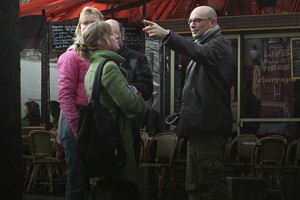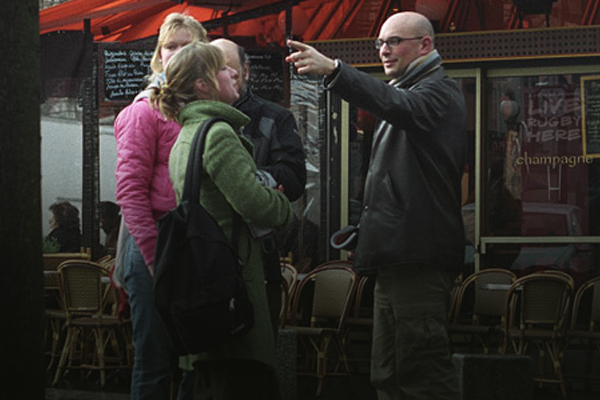
When Our Expectations Are Low, We’re Less Likely to Talk About God
As my expectations began to drop, I found myself saying less and less about Jesus. In the early years of my friendship with Bob, I was very open about my beliefs. I even bought Bob a Bible at a point when I thought he might be receptive. He never opened it and eventually said he misplaced it. As the years passed, Bob responded to my statements and efforts by teasing me or simply telling me he wasn’t interested. I eventually stopped talking about Jesus when we were together. My low expectations for Bob exposed my fallen, lazy nature. As a result, I talked less about what I believe.
When Our Expectations Are Low, We’re Less Likely to Model Christ
But something more insidious began to happen as Bob continued to reject any effort I made to share the truth about God. I found my character was often compromised. Police officers are often uniquely cynical, discouraged and sarcastic, given the broad variety of evil we deal with on a daily basis. It’s always a struggle to maintain Christ-like character in this line of work, but I started to notice I was far more likely to behave like the old Jim when I was with Bob (rather than when I was with other non-believers). Why? I’ve tried to examine my heart as honestly as possible, and I think my low expectations were part of the problem. Because I no longer expected Bob to become a Christian, I stopped modelling Christ for him. I was far more likely to slip into his level of sarcasm and cynicism than elevate him with my example of Christ’s character. I know how bad that sounds, but I’m trying to be honest. My low expectations for Bob exposed my fallen, sarcastic nature. As a result, I was less likely to be the man I’m supposed to be.
When Our Expectations Are Low, We’re Less Likely to Acknowledge God’s Power
In order to pull myself about of this spiraling complacency, I began to examine why I had such a low expectation for Bob in the first place. While it’s natural to get discouraged in the face of continuous rejection, we still have a choice about what we expect. As Christian, our future expectations aren’t dependent on what we do; they’re dependent instead on what God will do. Our hope is not in us, it’s in the All Powerful Creator of the Universe. As I examined my own low expectations for Bob, I eventually realized they were exposing my low expectations for God. I was denying the power and sovereignty of God and getting frustrated with my inability to reach Bob. The old self-reliant atheist in me was emerging once again. My low expectations for Bob exposed my fallen, limited belief. I found myself denying the power of God when considering the fate of my friend.
As Christians, our future expectations aren’t dependent on what we do; they’re dependent instead on what God will do. Share on X
Our expectations are a matter of choice, and our choices have consequences. As I examined my own low expectations, my true nature was exposed. Why wasn’t I sharing what I believed? Because I was lazy and tired of rejection. Why wasn’t I reflecting the nature of Christ? Because I’d come to see my behavior as a way to reach the lost rather than as a reflection of a truly changed life. Why didn’t I trust God for my expectations in the first place? Because I was slipping back into my old self-reliant denial of God’s power. Today when I am with Bob, I am a bit more patient and a lot more hopeful. Jesus told his disciples to pray expectantly (“Therefore I say to you, all things for which you pray and ask, believe that you have received them, and they will be granted you.” Mark 11:24). It’s also important to share expectantly. My evangelistic expectations are grounded now in the power of God to do something I used to think impossible. He did something like that with me, after all. My Christian friends never gave up, even when I gave them many reasons to quit. So now it’s my turn to share hopefully and tirelessly. I can’t allow low expectations to cause lackluster evangelism.

J. Warner Wallace is a Dateline featured Cold-Case Detective, Senior Fellow at the Colson Center for Christian Worldview, Adj. Professor of Christian Apologetics at Talbot School of Theology, Biola University, author of Cold-Case Christianity, God’s Crime Scene, and Forensic Faith, and creator of the Case Makers Academy for kids.
Subscribe to J. Warner’s Daily Email
J. Warner Wallace is a Dateline featured cold-case homicide detective, popular national speaker and best-selling author. He continues to consult on cold-case investigations while serving as a Senior Fellow at the Colson Center for Christian Worldview. He is also an Adj. Professor of Christian Apologetics at Talbot School of Theology, Biola University, and a faculty member at Summit Ministries. He holds a BA in Design (from CSULB), an MA in Architecture (from UCLA), and an MA in Theological Studies (from Gateway Seminary).

































Pingback: Weekend Apologetics Hit & Misc: The Spiritual Battle on D-Day - The Poached Egg Christian Worldview and Apologetics Network